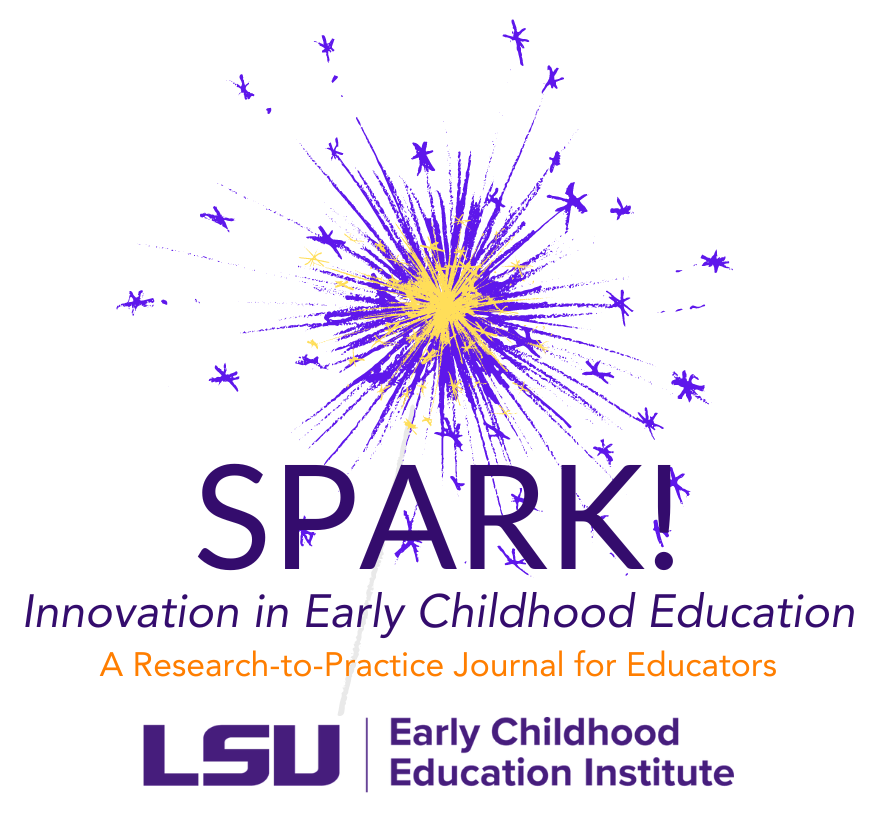
Publication Ethics Statement
Publication Ethics Statement
SPARK! Innovations in Early Childhood Education: A Research-to-Practice Journal for Educators
SPARK! is committed to maintaining the highest standards of ethical publishing in all aspects of our operations. Our ethical guidelines are designed to ensure transparency, integrity, and accountability in the publication process. We strive to provide a trusted platform for the dissemination of research and practices that benefit the early childhood education community.
Ethical Responsibilities of Authors
- Originality and Plagiarism: Authors must ensure that their submissions are original and have not been published elsewhere. Proper credit must be given to other researchers' work, and all sources should be appropriately cited. Plagiarism in any form is strictly prohibited.
- Authorship: Authors should ensure that all individuals who have made substantial contributions to the research and writing of the article are listed as co-authors. Disputes regarding authorship should be resolved before submission.
- Conflicts of Interest: Authors must disclose any potential conflicts of interest that could influence the objectivity of the research, including financial, personal, or professional relationships. Data Integrity: Authors are expected to present accurate data and analysis. Fabrication, falsification, or manipulation of data is unacceptable.
- Human and Animal Rights: Research involving human participants or animals must adhere to ethical standards. Studies involving human participants should have approval from an appropriate ethics committee, and informed consent must be obtained from participants.
Ethical Responsibilities of Reviewers
- Confidentiality: Reviewers must treat all submitted manuscripts as confidential. Information and data from the manuscript must not be shared with others without explicit permission.
- Fairness and Objectivity: Reviews must be conducted objectively, based on the content and merit of the manuscript, without bias or personal conflicts of interest.
- Timeliness: Reviewers are expected to complete reviews within the given timeframe. If unable to meet the deadline or if they feel unqualified to review the manuscript, they should notify the editor.
- Disclosure of Conflicts of Interest: Reviewers must disclose any potential conflicts of interest and recuse themselves from reviewing manuscripts where such conflicts exist.
- Acknowledgment of Sources: Reviewers should identify any relevant works that have not been cited by the authors and recommend additional references where appropriate.
Ethical Responsibilities of Editors
- Editorial Independence: Editors are responsible for making publication decisions based on the academic merit and relevance of submitted manuscripts. Editorial decisions should not be influenced by personal interests or external pressures.
- Fairness and Impartiality: Editors must ensure that all manuscripts are evaluated fairly and equitably, based on the quality and significance of the research, regardless of the authors’ background or affiliations.
- Confidentiality: Editors must keep all submitted manuscripts confidential and ensure that they are not disclosed to others outside the peer-review process.
- Conflict of Interest: Editors should avoid conflicts of interest and recuse themselves from handling manuscripts where such conflicts exist.
- Corrections and Retractions: Editors have the responsibility to issue corrections or retractions if serious errors or ethical violations are identified after publication.
Ethical Responsibilities of the Publisher
- Transparency and Integrity: The publisher is committed to upholding transparency in the publication process and ensuring that ethical standards are followed throughout.
- Support for Ethical Practices: The publisher supports the journal’s efforts to maintain these ethical guidelines and assists authors, reviewers, and editors in ensuring ethical conduct in all stages of the publication process.
- Handling of Complaints: The publisher is committed to addressing ethical concerns or complaints in a timely and fair manner. We will investigate any issues of misconduct and take appropriate action when necessary.
Policy on Plagiarism and Research Misconduct
SPARK! takes plagiarism and research misconduct seriously. Any manuscript found to contain plagiarized content or to involve falsified or fabricated data will be immediately rejected. Serious cases of misconduct may be reported to relevant academic or professional bodies.
Final Note
By submitting a manuscript to SPARK! Innovations in Early Childhood Education: A Research-to-Practice Journal for Educators, authors, reviewers, and editors agree to abide by the ethical standards outlined in this statement. We aim to support high-quality, responsible scholarship and practice in early childhood education, ensuring that the work published in our journal contributes to the advancement of the field.
